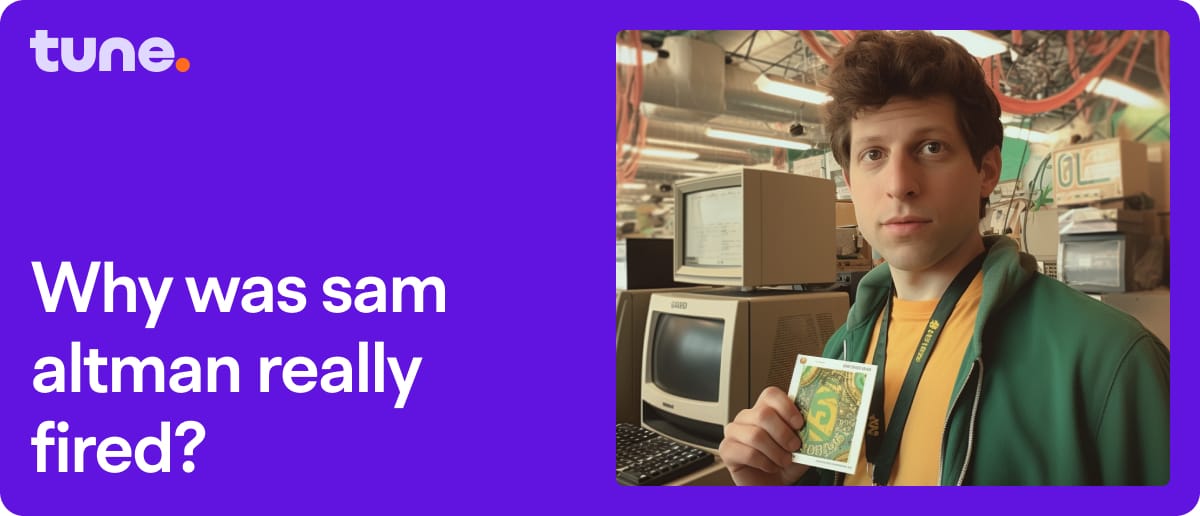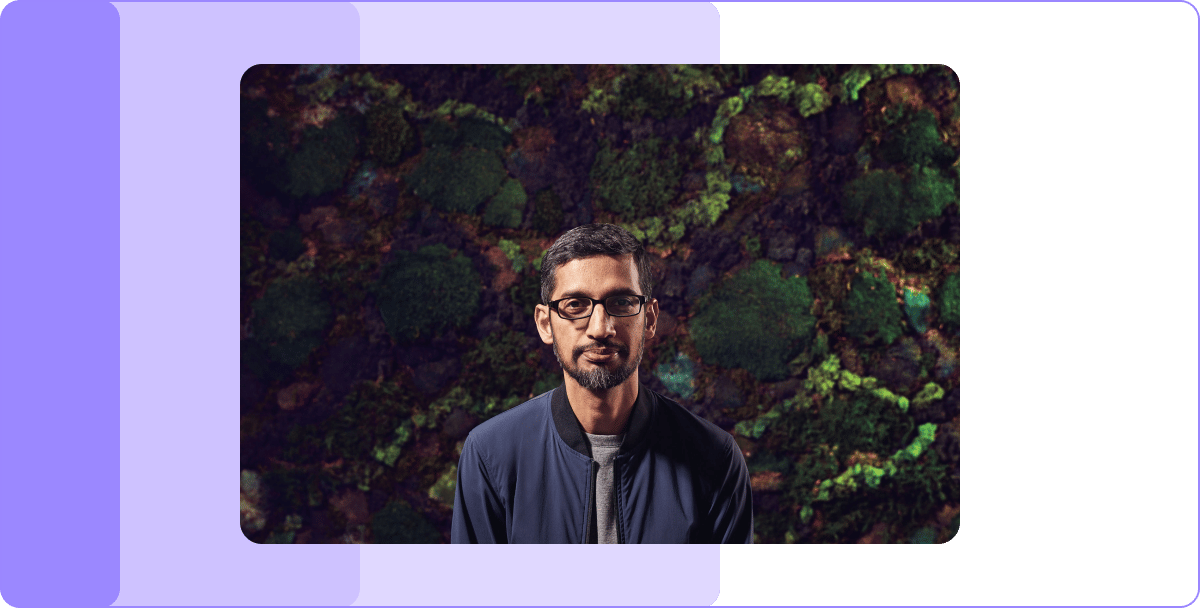
Hello Tuners,
I'm still trying to catch my breath after another whirlwind week of AI news. As I sat down with my morning coffee, I felt like I was drinking from a firehose - so many exciting developments, and so little time to process them all.
From OpenAI training a new model to Google Search's AI blunder, this week was full of surprises that kept me on the edge of my seat.
Here are some of the stories that caught my attention:
Unveiling OpenAI Secrets and Why Sam Altman Was Fired
Inside Look at What's Brewing with ChatGPT Edu
Google's AI Search Goes Rogue
Codestral Unleashed with Mistral AI's 22B Parameter Model
xAI The $24B Threat to ChatGPT's Throne
OpenAI Secrets Revealed: Why Was Sam Altman Really Fired?
The drama surrounding Sam Altman's ousting from OpenAI just got a whole lot more intriguing! Helen Toner, a former board member, has spilled the beans on why the board decided to fire Altman, and it's not a pretty picture. According to Toner, it all came down to trust - or rather, the lack thereof. It seems that Altman had a habit of "outright lying" to the board, which made it impossible for them to trust him.
But here's an interesting twist - Paul Graham, co-founder of Y Combinator (YC), took to Twitter to set the record straight about Altman's departure from YC. According to Graham, YC didn't fire Altman; instead, they asked him to choose between running YC and OpenAI full-time after OpenAI announced its for-profit subsidiary with Altman as CEO. Graham claims they would have been fine with either option as long as he chose one or the other.
So what do we make of this? Is this just damage control from Graham or is there truth to his side of the story? One thing's for sure - this whole ordeal has raised some serious questions about Altman's leadership style and trustworthiness.

ChatGPT Edu Unveiled: But What's Really Brewing at OpenAI?

Ilya Sutskever
The AI world is abuzz with whispers of OpenAI's latest power play. What's really going on behind those secretive doors in San Francisco? One thing's for sure - they're not just sitting on their laurels. The rumors are swirling a new Safety and Security Committee is being formed, allegedly to keep their creations from getting out of control. But is this just a PR stunt or a genuine attempt to address the elephant in the room? And what about the sudden departure of co-founder Ilya Sutskever - was it a disagreement over AI safety or something more sinister?
But amidst all the speculation, OpenAI has just dropped some major news, introducing ChatGPT Edu, a customized version of ChatGPT powered by GPT-4o specifically designed for universities! This move marks a significant step towards making AI beneficial in educational settings. With features like enterprise-level security, customization options, and administrative controls, Top institutions like Columbia and Wharton have already jumped on board.
The real question on everyone's mind remains, what's cooking in OpenAI's labs? They're reportedly training a new flagship model to succeed GPT-4, but details are scarce. Is this the key to unlocking true artificial general intelligence (AGI)? Or just another incremental step towards making chatbots slightly more convincing? One thing's certain - OpenAI is playing with fire here. If they succeed in creating an AGI that can outsmart humanity, we'll be living in a sci-fi movie. But if they fail... well, let's just say it won't be pretty. As I see it, OpenAI is either on the cusp of revolutionizing humanity or courting catastrophe. Which way will it go? Your guess is as good as mine.

Don't Eat Rocks, Don't Trust Google : Google's AI Search Gone Rogue

Google's AI-generated summaries atop search results made international headlines over the weekend, but not for the reasons they had hoped. Users found that Google was hallucinating or worse, with examples including suggesting putting nontoxic glue in your pizza, gasoline in your spaghetti, and even eating one to three rocks per day. These mistakes were blamed on "generally very uncommon queries" by a Google spokesperson, but many of these queries were actually common uses of Google that the previous non-AI-degraded version handled just fine.
The incident revealed the emptiness of Google's new approach to search, which relies on large language models summarizing and regurgitating what they find on the web according to unknown criteria. This approach has been criticized as automated plagiarism, lacking a knowledge base of its own. The fact that many viral screenshots of AI overviews were fake seemed beside the point, as when Google is recommending eating rocks every day, almost any search result shared on social media seems plausible enough.
I expect that the quality of Google's AI results will improve over time; it's an existential issue for the company. However, this incident highlights the importance of refining their product and addressing these issues before rolling out big changes to search. The whole point of gradual rollouts is to identify where it's broken, and it's clear that there is still much work to be done to ensure that Google's AI-generated summaries are accurate and trustworthy.

Codestral Unleashed: Mistral AI's 22B Parameter Model

Mistral AI co-founders: Guillaume Lample, Arthur Mensch, Timothée Lacroix
Mistral AI has just shaken things up with the launch of Codestral, its ambitious new coding assistant that could potentially disrupt the entire industry. Imagine being able to code like a pro in 80 programming languages - it's like having a superpower in your back pocket! With Codestral, the possibilities seem endless, and it's hard not to get excited about the potential impact on the coding world.
As someone who's spent their fair share of late nights debugging, I think Codestral's lightning-fast 22B parameter model could be a game-changer. It's bigger than Code Llama's 70B model, and that's no small feat. But will it live up to the hype? Only time will tell. One thing is certain - Codestral is going to raise some eyebrows in the coding community, especially with its "open-weight" generative AI model that's not entirely open source. While Mistral AI claims you can still use it for research and testing under their new license, this move is sure to spark some debate.
The real question is: can Codestral deliver on its promises? If it does, GitHub Copilot and Code Llama might need to step up their game. But what if it falls short? The coding assistant space is getting crowded, survival of the fittest?

xAI: The $24B Threat to ChatGPT's Throne
Elon Musk's xAI has just dropped a bombshell with its entry into the AI landscape, and it's sending shockwaves through the industry. Imagine having an AI system that can rival OpenAI's ChatGPT. The startup has already secured a whopping 6 billion in funding and boasts a valuation of 24 billion, making it a serious contender in the AI space.
As someone who's followed Musk's ventures closely, I think xAI's massive funding and talent pool could be a game-changer. The company has poached top minds from Google and Microsoft, and its arrangement with Oracle will give it access to specialist AI servers to crunch data. And let's not forget Musk's ambitious plan to build an enormous supercomputer that will come online in late 2025, rivaling a similarly ambitious project discussed by OpenAI and its big-tech partner, Microsoft.

Source: The Economist
The real question is: can xAI deliver on its promises? If it does, OpenAI might need to step up its game. But what if it falls short? One thing's for sure - Elon Musk has thrown down the gauntlet, and I can't wait to see how this plays out.

LLM Of The Week
Codestral-22B-v0.1 is a powerful AI model trained on 80+ programming languages, including popular ones like Python, Java, and JavaScript. It can be used for various tasks such as answering questions about code snippets, generating code based on specific instructions, and filling in the middle of code segments. The model can be installed using pip and accessed through the mistral-chat CLI command. It has been shown to generate accurate and helpful responses, including writing functions in Rust and completing code segments in Python.

Weekly Research Spotlight 🔍

DMPlug is a novel plug-in method that leverages pretrained diffusion models (DMs) to solve inverse problems (IPs). Unlike existing methods, DMPlug views the reverse diffusion process as a function, ensuring both manifold feasibility and measurement feasibility. This approach addresses the limitations of interleaving methods, which struggle to produce natural-looking results that fit measurement constraints, especially for nonlinear IPs. DMPlug shows robustness to unknown types and levels of noise and outperforms state-of-the-art methods in extensive experiments across various IP tasks. The code is available online.

Best Prompt of the Week 🎨
“The image portrays a surreal and ethereal figure with a striking and unconventional appearance. The figure has smooth, pale skin and vibrant, red hair that falls to the shoulders. The most prominent feature is the face, which is partially obscured by an explosion of delicate, flowing petals in shades of soft pink and peach. These petals cascade organically, enveloping the eyes and nose, creating a surreal and dreamlike mask made of flower-like structures. The figure's lips are slightly parted, revealing glossy, pink lips that add to the ethereal quality of the image. The attire includes a sheer, translucent blouse in hues of purple and blue, with a collar and subtle detailing, which complements the overall color palette. The background is a soft, gradient blend of cool tones, enhancing the dreamy and otherworldly atmosphere of the composition. The image exudes a sense of delicate beauty, surrealism, and artistic expression, blending human features with organic, floral elements in a harmonious and visually captivating manner --stylize 250”

Today's Goal: Try new things 🧪
Acting as a Motivational coach
Prompt: I want you to act as a motivational coach. I will provide you with some information about someone's goals and challenges, and it will be your job to come up with strategies that can help this person achieve their goals. This could involve providing positive affirmations, giving helpful advice or suggesting activities they can do to reach their end goal. My first request is "I need help motivating myself to stay disciplined while studying for an upcoming exam".

